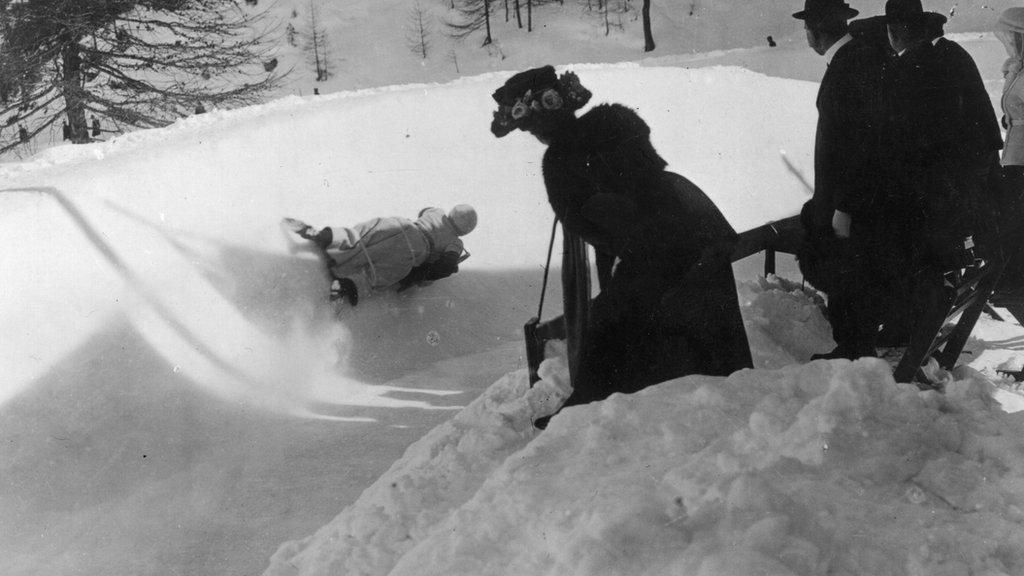Cresta Run: Women race the Grand National for first time in 103 years
- Published

Carina Evans has ridden the Cresta Run 139 times and is the Ladies' Grand National winner
"Exhilarating, risky and addictive. It's even crazier than downhill skiing." That's how four-time Olympian and Ski Sunday presenter Chemmy Alcott described the iconic Cresta Run.
Switzerland's St Moritz Tobogganing Club (SMTC) is home to the world's oldest and most feared natural ice chute.
And after a ban lasting 103 years, imposed because of fears it would cause breast cancer, women have been allowed to compete again, with the Cresta Run's Ladies' Grand National race taking place last month.
Although not in the race itself, Alcott wanted to experience tobogganing head-first down the polished track, which covers 1.2km from St Moritz to Celerina.
"I don't often hand over control of my life. But the Cresta demands it. Demands that you stop fighting, find the flow, and let go," said the 41-year-old. She hit a top speed of 55mph over 75 seconds on the 10-bend ice track.
It was an experience that left her "holding her breath", "hanging on for dear life" and "buzzing".
"I absolutely love being a learner, challenging myself mentally and physically to execute a plan. And I knew I had to contain my speed," Alcott said.
"If you get a buzz out of fear, if you are still pushing your boundaries and elevate yourself when you find your limit, then it is an incredible experience."
Alcott was riding the Cresta to highlight the "milestone" in winter sports of the first women's race since 1921.
"For the women collectively changing the future for this sport, I say chapeau to them," she said.
"For them, this might be nearly a minute of heightened adrenaline and speed but the reality is so much more."

Women competed on equal terms to men until 1921, when they were banned
It is Carina Evans' name that will go down in history as she became the first Ladies' Grand National winner in more than a century. She won in a time of 57.76 seconds at a top speed of 71.35mph.
The last women to win before the ban came into place was a Mrs Baguley, who in 1921 finished in 64.9 seconds.
Evans said: "It's the best thing I've ever done. I will remember that feeling for the rest of my life.
"This race has been a focus for years. It has taken a lot of determination and planning to get here.
"It represents so much more than just our individual hopes and dreams. We were racing it collectively for all the women who went before us."
The Cresta was built in 1884 and in 1887, the SMTC was founded by British military officers. Women and men competed equally in the annual Grand Nationals until the 1920s.
"Fears the toboggan banging could cause breast cancer were cited as the reason for the 1921 ban on female racers and 1929 expulsion from the club," said president James Sunley.
"But the reality is now widely agreed that they were getting rather too good - and fast."
In December 2018, members voted to overturn the long-standing ban, allowing women to ride again.
Evans was the first woman to ride the track when the ban was lifted and has now ridden the Cresta 139 times.
But since the restart, only 13 women - including four Britons - have qualified to ride from 'Top', the head of the run, meaning they can take on the full course.
"The full course is so extreme that riders must qualify to ride it posting consistently fast times on the lower banks and passing a 'raking exam'," explained secretary Martin Greenland.
"That proves they can execute a dead stop at speed. It usually takes multiple seasons to make it to 'Top'."
For the record, the men's Grand National, which also took place last month, was won by 2002 Olympic skeleton rider Lord Clifton Wrottesley, in a time of 51.90 seconds. With a record 17 consecutive wins, he is the greatest Cresta rider of all time.
But taking on the Cresta comes with a real risk: Five people have died on the run, the most recent death in 2017. Evans herself has crashed on the course.
Her passion for the Cresta Run comes from her father, the late Lieutenant-Colonel Digby Willoughby. A former bobsledder and chief executive of the SMTC, he was made an MBE in 2002 for services to the sport.
"The Cresta is in my DNA. I grew up with it, watching dad. I lived and breathed it," said Evans.
"I rode in the children's races from the age of eight - I loved beating the boys.
"Dad was a key instigator of the ladies' fun-races and one of our biggest champions. He would be cartwheeling in the sky."
And this year's historic race was also a family affair as Evans' 18-year-old daughter, Isabella, competed as they became the second mother and daughter to take part in a Grand National.
Club secretary Martin Greenland said: "Bringing the ladies back in is the greatest thing that has happened to the club in modern times. Kinny [Evans] couldn't be a more fitting winner."